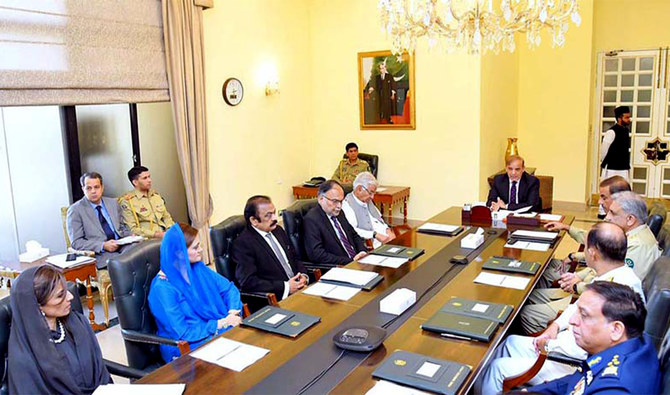ISLAMABAD: Pakistan Prime Minister Shehbaz Sharif has summoned a meeting of the country's National Security Committee (NSC) this week, the interior minister said on Monday, after a slew of audio recordings of conversations between key government figures were leaked online from the PM's office over the weekend.
The leaks involve discussions between PM Sharif and members of his cabinet, including conversations with ruling party leader Maryam Nawaz over the performance of outgoing finance minister Miftah Ismail, and with an unidentified official about the possibility of facilitating the import of Indian machinery for a power project for Nawaz’s son-in-law.
Opposition leader Chaudhry Fawad Hussain, a close aide to ex-PM Imran Khan, demanded an inquiry into the leak, saying the results should be shared with the public, while Talal Chaudhary, a ruling party leader, on Monday called the events a “serious issue of national security.”
Also on Monday, some more audio clips of conversations purportedly taking place at the PM's office surfaced online, prompting the prime minister to summon the NSC meeting.
"If this is bugging, if some devices were found installed there, then this is a serious matter," Interior Minister Rana Sanaullah said on a show aired on Pakistan's Geo News channel Monday night.
"It is important to get to the root of this matter and the government is taking measures for that. In this regard, the prime minister has also summoned a meeting of the National Security Council."
Members of the civilian-led Intelligence Bureau (IB) and the premier Inter-Services Intelligence (ISI) agencies will brief the committee on initial investigation into the leaks, he said.
"The picture will be clear after a detailed inquiry is conducted," Sanaullah added.
On Monday, ex-PM Imran Khan also said that another audio of Nawaz was going to surface online, which was related to him.
According to Khan, Nawaz is purportedly heard telling her father that the election commission is going to disqualify Khan in a repository case registered against the former premier for selling state gifts.
"The audio leaks have revealed one thing... the chief election commissioner is taking directions from them [Sharifs]," Khan said, in his address with students at a university in Lahore.
"Nawaz Sharif is telling him [chief election commissioner] who to disqualify, when to hold elections."
Sanaullah, however, downplayed Khan's claims, calling them an attempt "to stir a storm in a teacup."


















